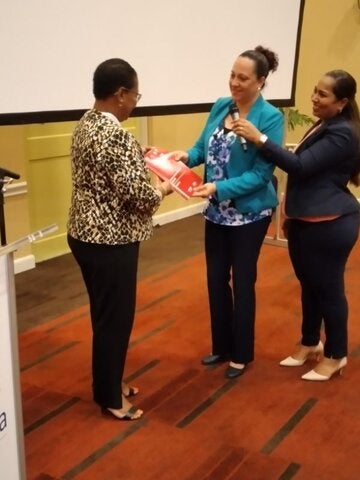PAHO/WHO for Suriname, 13 February 2020 - Due to an ageing population, urbanization and adaptation of unhealthy lifestyles, noncommunicable diseases (NCDs) are increasing worldwide. In Suriname, more than 60% of all deaths in 2013 could be attributed to NCDs, especially cardiovascular diseases, cancer and diabetes. Cancer related mortality rates have increased considerably the past decade, and cancer is currently the second leading cause of death, only preceded by cardiovascular diseases. Breast, prostate, cervical cancer are the leading cancers. Cancer-related mortality and morbidity, however, is to a large extent avoidable.
A comprehensive cancer control plan, aiming at prevention, early detection and improved care, could alleviate the cancer burden considerably. Therefore the Pan-American Health Organization (PAHO) provided technical and financial support to the Ministry of Health for the development of a National Cancer Control Plan which was launched on the 4th of February 2020, World Cancer Day.
During the launch Dr. Karen Lewis-Bell PAHO/WHO representative in Suriname mentioned two vaccines that help to prevent cancer. “Many may have heard about the HPV - vaccine, the vaccine against human papilloma virus, a primary prevention strategy against cancer and other HPV related cancers, but many of you would not even consider that the Hepatitis B vaccine was actually the first vaccine that was developed that actually can help to prevent cancer. It has to be given to children or young individuals, because when they are exposed to the virus at a young age, a high percentage of those individuals progress to develop liver cancer, said Dr. Lewis-Bell. According to her every family has been touch or effected by cancer, “so it should really be something personal for us. We should all be advocates for the prevention of cancer, early screening and early detection as well as treatment. Working together we can ensure improved access to cancer prevention strategies and care for the people of Suriname.”
The national cancer control plan aims, according to WHO recommendations, to reduce incidence, morbidity and mortality of cancer and improve the quality of life of cancer patients through the systematic implementation of evidence-based interventions for prevention, early detection, diagnosis, treatment and palliative care (WHO, 2006). “It will enable the government to formulate a comprehensive and systematic approach to the cancer problem, and will ensure an efficient and rational use of available resources,” said Els Dam, Oncologist, who led the process of writing and presenting the plan to the public.
Cleopatra Jessurun director of the Ministry of Health said that the rise in cancer incidence and the disproportional high mortality rate place a substantial demand on the health system and hamper the human, social and economic development of Suriname. “It is clear that cancer is a major health problem in Suriname. Cancer related mortality and morbidity however is to a large extent avoidable. Around 40% of cancer cases can be prevented by modifying known risk factors such as tobacco use, unhealthy diets and infectious agents. More than 30% of cancer cases can be cured if detected at an early stage. ” To increase knowledge and raise awareness among the public, the Ministry of Health will implement education programs and promote early diagnose of cancer.




